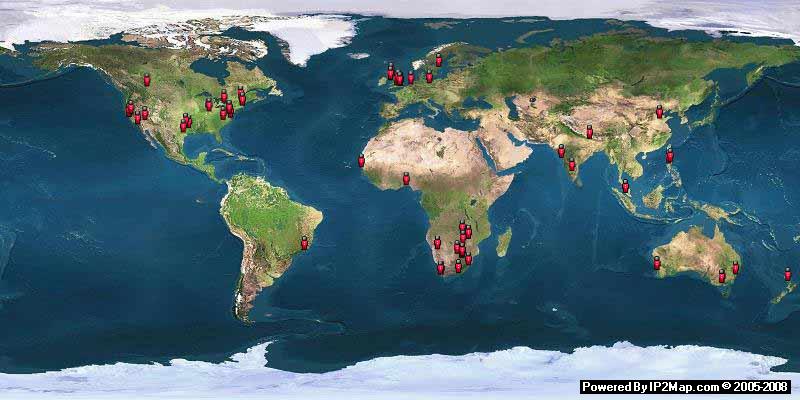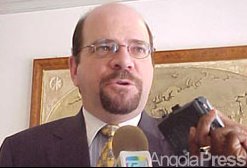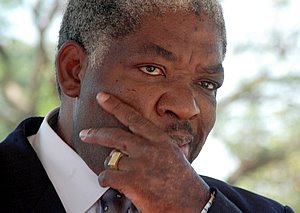Admit it: SA was right in its approach on Zimbabwe
April 09, 2007 Edition 1
For the first time, South Africa last month was honoured to lead and guide the UN Security Council as the president of this body, as part of our own national efforts to contribute to global peace and security.
Accordingly, we must communicate our sincere appreciation and gratitude to all members of the council, including members of the UN General Assembly for their co-operation in helping to ensure the smooth running of the business of the council during our presidency.
Prior to 1994, representatives of apartheid South Africa could not assume their position in the UN, let alone the UN Security Council.
As Oliver Tambo said at a UN General Assembly session in 1976: "It was a fault of the times that in 1945 representatives of the colonial system in South Africa were admitted to this organisation of the world's peoples.
"It is an insult to human reason and to the charter of this organisation; it is to spit on the graves of the patriots of our country and all those other heroes … who have perished in the struggle for liberation that our oppressors should have an acknowledged claim to appear in this assembly as our spokespersons."
This year, as we mark the 80th birthday of this great leader of our people, Oliver Tambo would have been proud to know that democratic South Africa, for which he sacrificed his entire adult life, has not only assumed its rightful place among the nations of the world as an equal partner, but also, In March 2007, was a rotating president of the Security Council, a consequence of its election to the non-permanent seat of the Security Council.
Yet, even as we took on this responsibility, we remained conscious of the strategic objective of transforming the council into a representative, democratic body reflective of today's world.
Accordingly, we remain convinced of the need for Africa to continue pushing for two permanent seats.
In this regard, we express our grave concern at the slow process of deliberation on the transformation of the Security Council.
We must express our most profound appreciation for the leadership and guidance of both President Thabo Mbeki and Foreign Minister Dr Nkosazana Dlamini-Zuma during the most difficult periods of our presidency, without whose support the mission to lead this world body would have been impossible to accomplish.
Pursuant to our aim of contributing to the maintenance of global peace and security, Dr Dlamini-Zuma had in a moment of historic pride for our country, assumed the presidency of the Security Council during the thematic debate on the "relationship between the UN and regional organisations, in particular the African Union (AU), in the maintenance of international peace and security".
In this regard, acting as the president of the Security Council, Dr Dlamini- Zuma had re-iterated the AU's view that the primary responsibility for the maintenance of global peace and security lies with the UN Security Council.
Accordingly, she had called upon the UN to examine within the context of Chapter VIII of the UN Charter the possibility of funding, through assessed contributions, peacekeeping operations undertaken by the AU, or under its authority, and with the consent of the UN.
"We need to articulate a clear form of burden sharing between the UN and regional organisations. This has to be based on the understanding that the goals of the AU and the UN in the maintenance of international peace and security are the same.
"Regional organisations, in particular the AU, are partners in carrying out the mandate of the UN, especially the Security Council.
"This requires us to think anew in determining the forms of concrete assistance that can be provided to regional organisations to address the challenge we all face," she said.
We are pleased to report that as a consequence of our country's presidency, the Security Council adopted a presidential statement calling for the enhancement of the relationship with regional organisations, including the intention to explore ways on how to share the burden of maintaining international peace and security.
The Security Council further requested UN secretary-general, Ban-Ki Moon, to provide a report with specific proposals on how the UN can better support arrangements for co-operation and co-ordination with regional organisations.
Under the leadership of Dr Dlamini- Zuma, the Security Council welcomed the agreement signed by President Laurent Gbagbo of Ivory Coast and Guillaume Soro of the main rebel group, the New Forces, in Ouagadougou, Burkina Faso, and called for the parties to implement it fully, in good faith and within the timetable agreed.
The Security Council, in recognition of positive developments in Rwanda, also took a decision to lift the requirement for notification of arms sales to that country, which was set up in 1995.
Inspired by the leadership of President Mbeki and Dr Dlamini-Zuma, our representatives in New York led the adoption by the Security Council of another presidential statement to mark International Women's Day on March 8.
Consistent with our own national policies and efforts to address gender inequalities in all spheres of our lives, the council in this statement re-affirmed the centrality of women in the prevention and resolution of conflicts and in peace-building, while stressing "the importance of their equal participation and full involvement in all efforts for the maintenance and promotion of peace and security, and the need to increase their role in decision-making with regard to conflict prevention and resolution".
Under our presidency, the international community also received a response to the letter of the secretary-general from Sudanese President Omar al-Bashir regarding the deployment of a hybrid UN-AU Force to Darfur.
Members of the council are considering this Sudanese response. Nonetheless, Security Council members remain of the firm view that the roadmap to peace in Darfur lies only in the full implementation of the AU-UN agreement on the matter.
Our presidency also witnessed the tabling of a resolution on Iran by the five permanent members of the Security Council and Germany.
In this context, and as president of the council, we insisted on the right of non-permanent members to engage and make amendments to this resolution, some of whom were accepted by the co-sponsors of the resolution.
As expected, our principled position in this regard was projected as an attempt to unravel the unity of the Security Council.
Some within our country, with a dearth of understanding of the inner workings of the Security Council, even went further to communicate falsehoods that South Africa's foreign policy seeks nothing but the defence of dictators around the world.
As Oliver Tambo said, we must necessarily and in equal but firm measure, reject their claim and pretence to represent the views of our country on this matter.
We will continue to insist on and express the view that the resolution thus unanimously adopted by the Security Council, with our amendments in place, must necessarily galvanise the world towards a peaceful resolution of the Iranian question rather than lay a basis for war and conflict.
We know, and know only too well, what pain and suffering war and conflict bring to bear on the lives of innocent and defenceless women, men and children.
South Africa also dealt with calls for the council to debate the humanitarian situation in Zimbabwe following recent arrests and assaults on opposition leaders.
While we did not oppose the briefing to the Security Council on the matter, we maintained the view that it is receiving the attention of the Human Rights Council.
This does not mean that we are less concerned about the situation in Zimbabwe.
However, when falsehoods are advanced that South Africa, and President Mbeki in particular, remained silent in the face of human rights abuses in Zimbabwe, we must of necessity re-iterate Oliver Tambo's call to reject these false claims and pretence to speak on behalf of our country on this matter and assert the truth.
President Mbeki's government has expressed its grave concern at the situation in Zimbabwe, characterising the situation as symptomatic of underlying political and economic challenges facing Zimbabwe while calling for dialogue mainly between Zanu-PF and the Movement for Democratic Change, acting with the assistance of the international community, to help bring about a lasting and amicable solution to challenges facing Zimbabwe.
Recently, the Southern African Development Community re-affirmed the need for dialogue between Zimbabwe's political protagonists, a call consistently made by South Africa, and further entrusted President Mbeki with the responsibility of facilitating this dialogue.
We hope our detractors will muster the courage of their own conviction in acknowledging their flawed analysis of our approach to Zimbabwe.
We cannot help but agree with the observation by one great philosopher that this flawed analysis of South Africa's foreign policy is nothing but "buffoonery pretending to be witty".
The all-new Yahoo! Mail goes wherever you go - free your email address from your Internet provider.












No comments:
Post a Comment